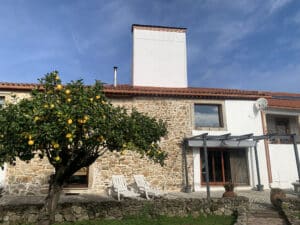Open Letter adds to groundswell of opposition to revised land law
In an open letter, more than 600 experts and former political leaders in Portugal have criticised the government’s measure to make it easier to build on rural land. They believe it will not solve the housing crisis and harm the environment in the process.
The government amended the legal regime for land management instruments to allow construction on land that had previously been prohibited, including in National Agricultural Reserve (RAN) and the National Ecological Reserve (REN), justifying its intention to increase the supply of land on which to build housing while guaranteeing the preservation of protected areas.
The law was published in the official government gazette on 30 December, to come into force at the end of January.
In a letter, more than 600 academics and specialists linked to housing and the land, as well as former members of the PS and PSD governments and other public figures, consider that “the conversion of rustic land into urban land under the conditions now created will not contribute to solving the housing crisis and will harm agriculture, the forest and the environment, encouraging the occupation of land” in RAN and REN areas.
The initiative was organised by Rede H – National Network for Housing Studies, a group made up of members of academia, civil society, public and private bodies and institutions who share an interest in housing.
The group emphasised that it agrees with the considerations of the country’s president when he promulgated the changes to the ‘land law’, when Marcelo Rebelo de Sousa considered that they represent “a significant twist in the matter of the generic regime of land use and planning”.
The signatories claim that “the possibility of reclassifying rustic land as urban land goes against the principles of the legal regime in which it is included and does not follow a logic of public interest“.
“It will also fragment rustic soil that is essential to our food security and encourage the sudden increase of rustic land for real estate purposes, inhibiting its productive use,” they emphasise.
The signatories believe that “neither the need to use funds” from the Plan for Recovery and Resilience (PRR) nor “the serious housing crisis can be alibis to justify the ‘significant twist’ recognised by the president, not least because reality contradicts them”.
“There is no general shortage of urban land within urban perimeters; there are local authorities with serious housing shortages that have not proceeded with PRR applications for different reasons, and the PRR funds earmarked for housing have been contracted with local authorities and eligible beneficiary entities – so there is no risk of losing funding due to a lack of land,” they say.
The open letter advocates avoiding a pattern of “proliferation of peripheral neighbourhoods that stigmatises those who live in them, perpetuating poverty and aggravating social costs”.
On the other hand, they call for “housing policies that reduce pressure on urban sprawl and counteract territorial disorder and segregation”, efficient urban management policies, greater public investment in affordable housing, better use of the housing stock, inclusive zoning and the use of IMI (land tax) to regulate land use and discourage speculation.
Among signatories are members of various PS and PSD governments. Also signing the document are former directors general and public managers in the areas of Territory and Housing, environmental association leaders, as well as other public figures.
With all the concerns being raised about this new law, MPs today have approved the calling to parliament of municipal leaders (who have already warned they need more guidance to handle this change), the ministers of infrastructure and of cohesion, and other experts.
Source material: LUSA



















